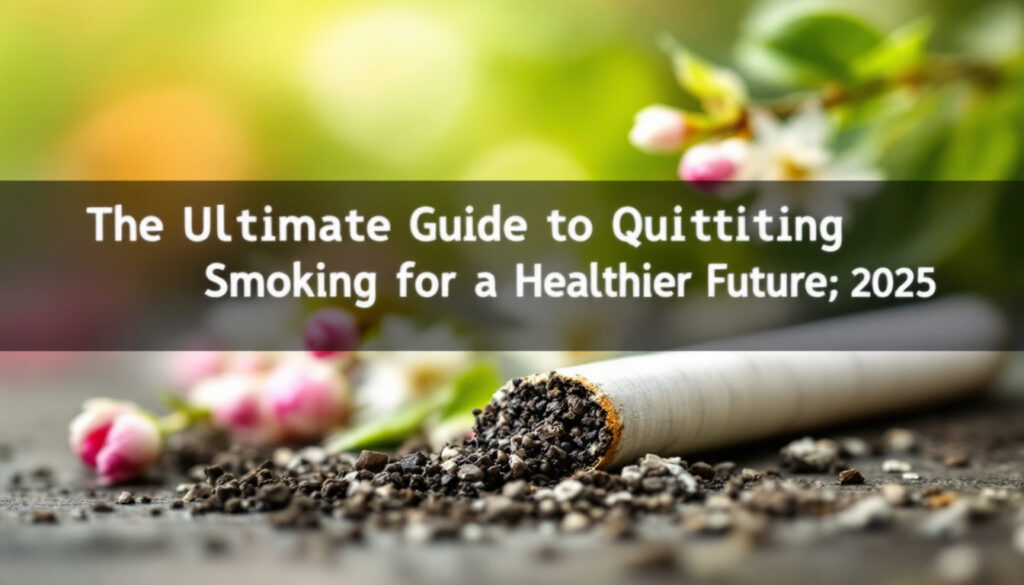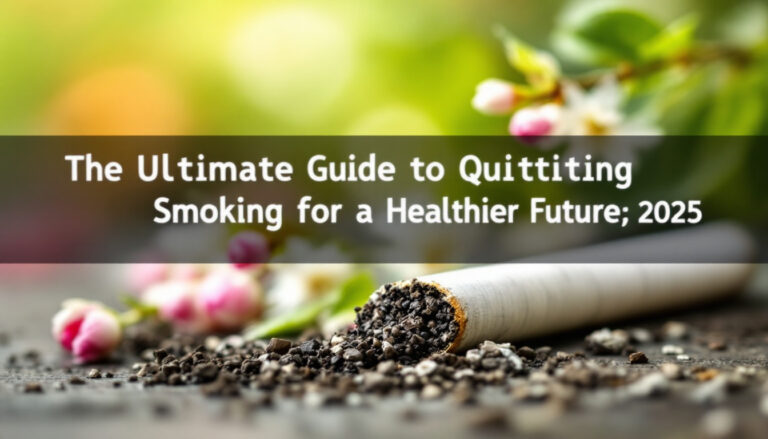Quitting smoking is one of the most life-changing decisions you can make for your health and well-being. It’s not just about saying goodbye to a harmful habit—it’s about embracing a future filled with better physical health, mental clarity, and increased energy. Within days of quitting, your body begins to repair itself, offering a glimpse of the profound changes to come. The journey might feel tough, but the rewards, like reducing your risk of serious diseases and regaining control over your life, are worth it. If you’re ready to discover the powerful benefits of quitting smoking and how it transforms your body over time.
Table of Contents
Toggle
Immediate Changes After Quitting Smoking
Quitting smoking sets off a chain of positive changes in your body and mind almost instantly. Let’s explore what happens in the hours and days after you take that first step toward a smoke-free life.
Within 20 Minutes
The first health benefits of quitting smoking can be seen in just 20 minutes. After you stop smoking, your heart rate and blood pressure begin to lower, reducing stress on your heart. It’s like your body is taking its first deep breath of relief. While it’s just the start, these early adjustments set the foundation for greater cardiovascular recovery down the line.
If you want to learn about how quitting smoking impacts your daily life, check out these productivity tips.
Within 24 Hours
In just 24 hours, the levels of carbon monoxide in your blood drop dramatically. Carbon monoxide, a dangerous gas found in cigarette smoke, hinders your blood’s ability to carry oxygen. When it decreases, oxygen levels in your body rise, making it easier for your organs to function properly. These immediate changes allow for improved lung function and can give your energy levels a noticeable boost. For more insight into this process, you can refer to this Medical News Today article on the timeline after quitting smoking.
Within 48 Hours
By the 48-hour mark, the body’s healing process is fully underway. Smoking damages nerve endings, which can dull your ability to taste and smell. But as these nerve endings begin to regenerate, your senses of taste and smell return, often making food and everyday scents more enjoyable. It’s like rediscovering a once-lost world of flavor and fragrance—one more reason to celebrate your decision to quit.
Psychological Impact
The physical changes aren’t the only aspect of quitting smoking; there are psychological hurdles too. Withdrawal symptoms like irritability, strong cravings, and mood swings can challenge your willpower. These feelings are natural and temporary but may feel overwhelming at times.
Here are a few tips to mentally prepare for these changes:
- Create a support system: Talk to friends or family who can encourage you.
- Stay busy: Distractions like hobbies or exercise reduce the urge to smoke.
- Practice mindfulness: Deep breaths or guided meditation can help you stay calm.
If you’re experiencing mood-related symptoms, the CDC has outlined common withdrawal symptoms that might help you prepare. Read about them here.
With the right preparation, navigating the psychological challenges becomes easier, bringing you closer to a healthier and smoke-free lifestyle.
Short-Term Benefits of Quitting Smoking
Quitting smoking offers rapid rewards that may surprise you. While long-term health benefits often grab attention, the short-term improvements also make life better almost immediately. From breathing easier to saving money, here’s what you can expect in the early stages of quitting.
Within the First Week
In the first few days, your body begins to heal itself, and you’ll notice softer, more controlled breathing. Smoke harms your lungs by irritating and inflaming the bronchial tubes—this is why smokers often have persistent coughing or shortness of breath. Thankfully, within just a week of quitting, these tubes start to recover. You’ll likely experience less coughing and mucus production as your lungs begin to clear out the built-up toxins.
According to the truth initiative, even within a week, your lung function starts to improve, making each breath feel easier and more fulfilling. These rapid changes remind us of how quickly the body can repair itself once it’s given a chance.
After One Month
Just one month after quitting smoking, the shifts in your body become even more noticeable. Blood circulation improves significantly, making your skin look healthier and clearer. Poor circulation caused by smoking often contributes to dull or sallow skin. With improved blood flow, oxygen and essential nutrients reach your skin more efficiently, restoring its natural glow.
Better circulation not only affects your skin but also helps you feel more energized. You may find that activities like walking or running become more enjoyable, as your stamina increases. For a detailed look at these benefits, you can explore the CDC’s overview on quitting smoking.
Financial Savings
Let’s face it—smoking is expensive. If you consider the daily cost of buying cigarettes, it’s like throwing away money that could be used for more rewarding experiences. By quitting, you may save hundreds or even thousands of dollars in a year, depending on how much you smoke.
What could you do with that extra cash? Think of all the health-focused investments you could make. Join a yoga studio, buy fresh organic groceries, or enroll in a fitness class. You can also channel the savings into leisure or hobby activities that enrich your life—things you may not have had the time or funds for before. For more ideas on improving your life, you might check thisproductivity guide.
Financial benefits leave you in a stronger position to prioritize personal growth and wellness. It’s great motivation to stay smoke-free!
Long-Term Benefits of Quitting Smoking
Quitting smoking is one of the best investments you can make in your health, not just for the immediate benefits, but for the profound changes that unfold over the years. Every milestone you reach adds another layer of protection against major health risks. Let’s break down what to expect as time goes on.
After One Year: Coronary Heart Disease Risk Drops by 50%
The first year after quitting smoking marks a significant victory for your heart health. Smoking causes the buildup of plaque in arteries, increasing the risk of coronary heart disease. However, after just 12 months of being smoke-free, your risk of developing coronary heart disease drops by 50%. That’s incredible progress in protecting your cardiovascular system.
If you’re curious about this transformation and other benefits, this resource on quitting smoking benefits over time provides a closer look.
Five Years Smoke-Free: Reduced Stroke Risk and Healthier Blood Vessels
Reaching five years without smoking is another monumental milestone. By this time, the risk of a stroke is comparable to someone who has never smoked. Smoking thickens the blood and damages blood vessels, but five years of recovery significantly improves blood flow and vessel health. This change makes your heart work less hard and helps your brain remain active and well-functioning.
Your body’s recovery within this period is a clear sign of resilience. You can also understand more about how quitting helps reduce stroke risk and improves overall blood vessel function by visiting this guide.
Ten Years Smoke-Free: Lower Lung Cancer Risk and Other Cancer Reductions
At the ten-year mark, something amazing happens. Your lung cancer risk, which was significantly elevated due to smoking, drops by approximately 50%. Additionally, the risks of other cancers—such as those affecting the mouth, throat, bladder, kidneys, and pancreas—are also significantly reduced. This decade-long commitment to quitting smoking reinforces that your body continuously works to repair the damage caused by smoking.
For details on the long-term impact quitting can have, check out this detailed guide on quitting smoking benefits.
Fifteen Years Smoke-Free: A Heart as Healthy as a Non-Smoker’s
Fifteen years smoke-free is a well-deserved milestone. By this point, your risk of coronary heart disease equals that of someone who has never smoked. Your heart and blood vessels function far better, making this a complete recovery from the cardiovascular risks of smoking. At this point, your dedication has literally added years to your life expectancy.
Quitting smoking is not just about avoiding harm; it’s about allowing your body to thrive. For more insights into how your body benefits, visit helpful resources like this NHS guide to quitting smoking.
Keep going, stay smoke-free, and embrace the enduring health rewards waiting for you on this journey.
Challenges of Quitting Smoking and How to Overcome Them
Quitting smoking is not just about the physical act of stopping—it’s a significant lifestyle adjustment. You might face a variety of challenges, including mental, emotional, and social hurdles. Knowing what to expect and how to manage these difficulties can make your journey smoother. Let’s look at common obstacles and how to overcome them.
Common Withdrawal Symptoms
When you quit smoking, your body needs time to adjust to the absence of nicotine. This can lead to a range of withdrawal symptoms, including:
- Cravings: These can feel overwhelming but typically lessen with time. Distracting yourself with a short walk or chewing gum can help.
- Mood Swings: It’s normal to feel irritable or anxious during withdrawal. Deep-breathing exercises or meditation can ease this.
- Fatigue: You might feel unusually tired as your body detoxifies. Stay hydrated and get plenty of rest.
- Difficulty Concentrating: Nicotine withdrawal can affect your focus temporarily. Break tasks into smaller steps and take regular breaks.
Understanding the science behind these symptoms can help normalize your experience. For more details on withdrawal and how to handle it, check out this resource.
Coping Strategies
Overcoming the challenges of quitting smoking requires practical steps and a plan you can stick to. Here are some proven strategies:
- Nicotine Replacement Therapies (NRTs): Products like gums, lozenges, and patches can reduce cravings while allowing your body to wean off nicotine gradually.
- Stress Relief Techniques: Manage stress with activities like yoga, meditation, or journaling. Hobbies and physical activity can also provide an outlet.
- Maintain a Healthy Diet: Eating nutritious meals can stabilize your mood and energy levels. Avoiding alcohol and caffeine may also lessen cravings.
Remember, the key is to experiment and find what works best for you. Learn more about coping with the process here.
Building a Support System
The journey to quitting smoking isn’t something you have to face alone. Having a solid support system can significantly increase your chances of success.
- Friends and Family: Let your loved ones know about your decision. They can offer encouragement during difficult times.
- Support Groups: Joining a group of others who are also quitting can foster a sense of community and accountability.
- Professional Help: Therapists or counselors can provide guidance tailored to your challenges.
Creating a smoke-free environment with the support of close relationships can make all the difference. If you’re interested in connecting with resources or groups, explore support options at this link.
The Role of a Healthy Lifestyle After Quitting
Quitting smoking is a tremendous accomplishment, but the journey to a healthier you doesn’t stop there. Adopting a healthy lifestyle after quitting not only boosts your recovery but also contributes to long-term well-being. From exercise to mental health strategies, there’s a lot you can do to support your smoke-free life.
Exercise
Regular physical activity plays a key role in improving lung health and reducing stress after quitting smoking. When you quit, your lungs begin repairing themselves, and exercise can speed up this recovery. Activities like walking, swimming, or yoga can improve lung capacity and make breathing feel easier.
Exercise is also a natural stress reliever. It promotes the release of endorphins, which are chemicals in your brain that improve mood. This can be especially helpful in managing withdrawal symptoms such as irritability or anxiety. Plus, staying active keeps your mind occupied, reducing the temptation to smoke.
If you’re looking for ways to make exercise a part of your daily routine, it’s worth exploring resources like The Benefits of Quitting Smoking Now to see how physical activity complements your decision to quit.
Diet and Nutrition
What you eat and drink can significantly impact your recovery. Certain foods are known to aid in nicotine detox, helping your body repair itself. Foods rich in antioxidants, such as berries, oranges, and leafy greens, combat the oxidative stress caused by smoking. Incorporating these into your diet can promote cell repair and protect your lungs.
Hydration is another critical factor. Smoking dehydrates the body, leaving you feeling fatigued. Drinking plenty of water helps flush out toxins, reduces withdrawal symptoms, and boosts energy levels. Herbal teas and fresh juices are also excellent choices for staying hydrated.
For a deeper understanding of how diet supports recovery, this article explores the broader health benefits of quitting smoking.
Mental Health Strategies
Addressing your mental health is just as important as caring for your physical health. Quitting smoking can stir up emotions like anxiety, irritability, or even depression. Practicing mindfulness techniques such as meditation or deep-breathing exercises can help calm the mind and keep stress at bay.
If anxiety or depression becomes overwhelming, consider talking to a therapist. Cognitive-behavioral therapy has been shown to help people manage emotions tied to quitting smoking. Surrounding yourself with supportive friends or joining a smoking cessation group can also provide emotional relief.
Navigating post-smoking mental health can be tough, but you’re not alone. To better understand coping mechanisms, take a look at Benefits of a Healthy Lifestyle After Quitting Smoking.
A balanced approach involving exercise, nutrition, and mental health care will ensure you stay on the path to a healthier, smoke-free life.
Frequently Asked Questions About Quitting Smoking
Quitting smoking can feel overwhelming, and it’s normal to have questions about what to expect. Discomfort from withdrawal, concerns about health, and managing the physical and emotional changes are common worries. Let me break down some of the most frequently asked questions, so you’re prepared for the journey ahead.
How Long Does Nicotine Stay in Your System?
Nicotine starts leaving your body just hours after your last cigarette. However, its full elimination depends on several factors, such as your metabolism and level of smoking before quitting. Nicotine generally takes about three days to leave your system. That said, some breakdown products, like cotinine, can linger for up to 10 days.
During this process, your body begins repairing itself almost immediately. For example, within 48 hours of quitting, damaged nerve endings start regenerating, helping restore your sense of taste and smell. If you’re curious about how your body heals after quitting, take a look at this detailed Q&A from the Lung Association.
What Are the Best Ways to Handle Cravings?
Cravings are one of the toughest challenges former smokers face after quitting. But you don’t have to fight them alone. Try these practical strategies:
- Distract Yourself: Cravings are often short-lived. Keep your hands or mind busy with things like puzzles, knitting, or journaling.
- Chew Gum or Snack Wisely: Sugar-free gum or carrot sticks can help keep cravings at bay without overeating.
- Drink Water: Staying hydrated can help flush nicotine and curb smoking urges.
- Practice Deep Breathing: Inhale deeply, hold for a few seconds, and exhale—this calms your nervous system and mimics the act of smoking.
For more tips to conquer cravings, visit this guide to quitting smoking techniques. Remember, cravings might feel intense but typically last only about 5 minutes.

Photo by freestocks.org
How Does Quitting Smoking Affect Weight Gain?
It’s true that some people gain weight after quitting smoking. Nicotine acts as a stimulant, which can suppress your appetite and speed up metabolism. When you quit, your body may normalize, leading to an increase in appetite.
Here are some tips to maintain a healthy weight while quitting:
- Focus on Nutrition: Eat plenty of fruits, vegetables, and whole grains to keep your body nourished.
- Snack Smart: Choose healthier options like nuts, low-fat yogurt, or popcorn.
- Get Moving: Regular exercise, such as walking or swimming, can help balance your calorie intake.
- Avoid Alcohol: Alcohol is calorie-dense and may also trigger cravings for cigarettes.
Weight gain doesn’t have to be part of your quit-smoking journey. If you stay mindful of your diet and activity levels, you can maintain or even improve your health long-term. Learn more at this resource for FAQs about quitting.
What Happens to Your Lungs After You Quit Smoking?
Quitting smoking initiates a slow yet impressive healing process in your lungs. It doesn’t happen overnight, but the changes are monumental.
- Within 2 Weeks to 3 Months: Your lung function improves, and you’ll breathe easier as your airways repair themselves.
- Within 6 Months: Coughing and mucus production, common among smokers, start to decrease as your lungs clean themselves.
- Within a Year: Tiny hair-like structures called cilia regenerate. These help remove toxins and mucus from your lungs.
The ultimate improvements depend on how long and heavily you smoked, but any reduction in damage is a victory. For a deeper look at lung recovery, consider checking out this resource on frequently asked questions.
Can Former Smokers Expect to Live as Long as Non-Smokers?
The answer is encouraging: yes, former smokers can significantly extend their lifespan by quitting. Studies show that people who stop smoking by their early-to-mid-30s can add nearly 10 years to their lives. Even quitting later has substantial benefits—former smokers see their risk of death from smoking-related diseases cut by half within 10 years of quitting.
For resources tailored to your stage in the process, head to FAQs about quitting smoking. Quitting smoking is truly a life-saving choice.
Relevant Amazon Affiliate Links for Quitting Smoking
Here are five products to support your smoke-free lifestyle:
- Nicotine Replacement Gum – Helps manage cravings effectively while gradually breaking the smoking habit. Great for those navigating nicotine withdrawal.
- Pocket-Sized Stress Relief Balls – A handy way to relieve tension during cravings. Small, discreet, and easy to carry.
- Aromatherapy Essential Oil Diffuser – Promotes relaxation, combats stress, and creates a calm smoke-free environment at home.
- Quit Smoking Journal – Keep track of your progress, set goals, and stay motivated through personal reflections and milestones.
- Exercise Resistance Band Set – Simple tools to integrate fitness into your routine and maintain overall health as you quit.
These tools address common challenges faced by those quitting smoking and make the journey a little smoother.
Conclusion
Quitting smoking is one of the best decisions you can make for your health, both now and in the future. The positive changes your body undergoes, even just hours after your last cigarette, show how resilient and capable it is. Every step you take away from smoking brings you closer to a life of improved health, energy, and freedom.
If you’re considering quitting, know that the journey is challenging but profoundly rewarding. Take it one day at a time, and lean on resources, tools, and support systems to guide you.
You’re not just quitting a habit—you’re reclaiming control over your life. Stay committed, and let this be your defining step towards a healthier, brighter future.









